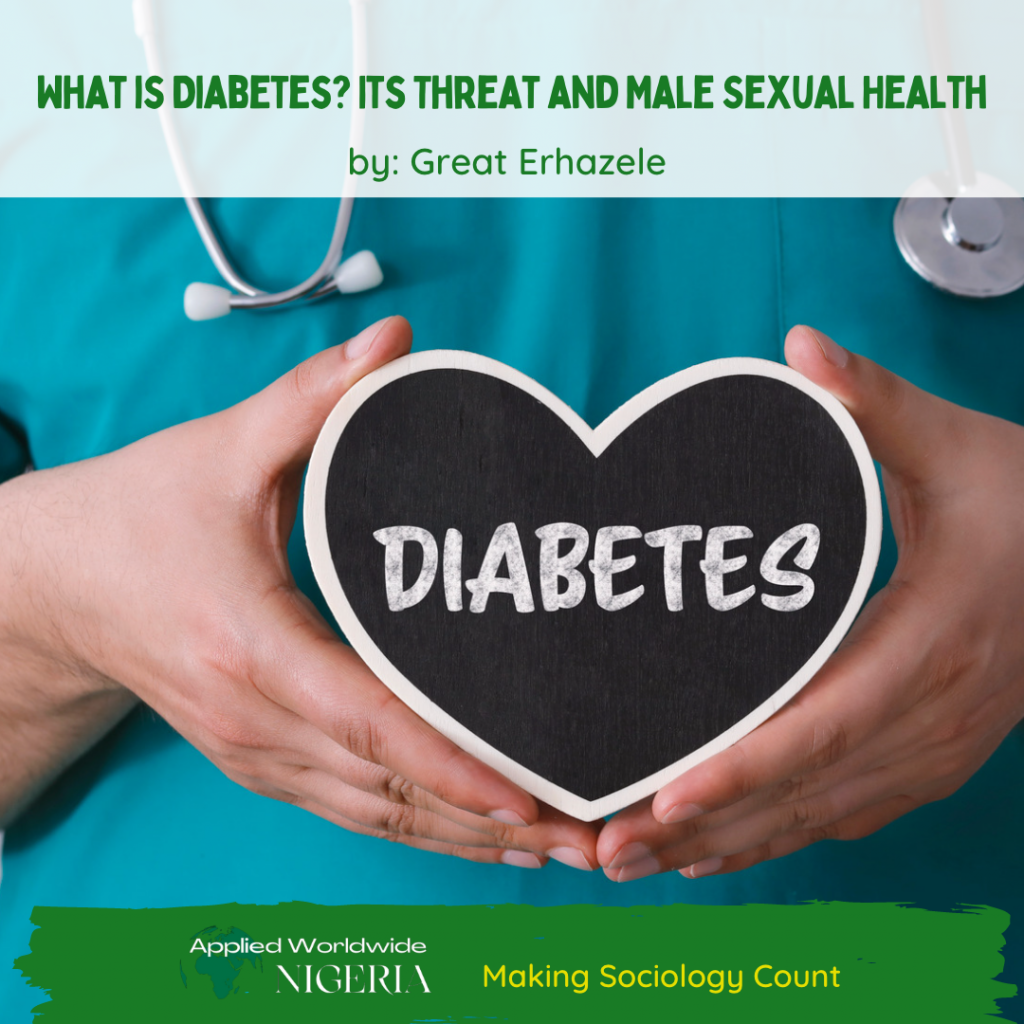Data from Statista estimates that 537 million people are currently living with diabetes all over the world, a huge leap from the 422 million cases reported in the WHO studies of 2015. These studies also show that males are twice more likely to develop Type 2 diabetes and project the number of diabetic cases to hit 783 million by 2045 (Statista publication, September 2022). We will take an extensive look at what is diabetes and how it affects male sexual health below.

What is Diabetes?
Diabetes is a disease that causes an abnormal increase in blood sugar levels by affecting insulin release and function. Insulin is a hormone critical in the regulation of glucose, proteins, and fat metabolism. The complications of diabetes include damage to multiple organs like the eyes (diabetic retinopathy), the limbs (diabetic foot), the heart and blood vessels (heart attack, atherosclerosis), the kidneys (diabetic nephropathy), the brain (stroke), and the urogenital tract (infections, erectile dysfunction, infertility).
Diabetes and Male Sexual Health
Diabetes can have a major effect on a man’s sex life, either by directly damaging the blood vessels and nerves of the penis, infections, or psychologically from conditions like anxiety and depression. It is estimated that the chances of developing erectile dysfunction and ejaculatory dysfunction are markedly increased in diabetic patients. Some publications state that 35-75% of men with diabetes are likely to experience some degree of erectile dysfunction.
How does Diabetes Affect Male Sexual Health?
Dr. Adunbiola, a Consultant Endocrinologist at Irrua Specialist Teaching Hospital, Nigeria explains how these damages occur;
“There are several ways by which diabetes affects sexual performance in men,” he says,
- The disease can damage arteries that carry blood to different areas of the body, including the penis. The arteries help in achieving and maintaining an erection. This leads to a decrease in libido (low sex drive), erectile dysfunction (impotence), and infertility.
- Diabetes also interferes with the production of testosterone and other sex hormones. This can cause hypogonadism, resulting in erectile dysfunction, low sperm count, and infertility. Study shows that 1 in 4 men with Type 2 diabetes suffer from hypogonadism, and the risk is increased in overweight diabetic patients.
- The disease also affects the nerves (neuropathy), which results in numbness and pain around the genitals. Enjoying sex may become painful.
- Diabetes can affect a person’s immunity and can increase the risk of infections around the genitals (balanitis – an infection of the glans penis, and Fournier’s gangrene – a rare fulminant complication of low immunity, are both seen in cases of poorly managed diabetes.
- Lastly, The disease also damages sperm DNA, a process called nuclear fragmentation, leading to reduced sperm count, subfertility, and even infertility.”
Antidiabetics Drugs: Does Metformin Cause Erectile Dysfunction?
Metformin, a highly efficacious oral hypoglycemic, is a mainstay drug for the management of Type 2 DM. A 2016 study by Al-Kuraishy and colleagues reported an increased likelihood of erectile dysfunction in diabetic males treated with metformin. Another retrospective cohort study also supported these claims but noticed a lesser risk of prostate-related diseases when patients were managed with metformin.
These are isolated studies with little consensus in the Medical community. Metformin remains a mainstay drug in the management of Type 2 DM. There is, however, a need for more studies on the subject.
Management: What Can You Do?
While enjoying a healthy sex life with a diabetic condition may seem difficult, a high level of commitment toward staying healthy, plus some steady communication with your doctor and your partner makes it possible. Here are a few things you can do according to Dr. Adunbiola;
- Endeavor to maintain a proper blood sugar level, this will help prevent complications of diabetes from setting in. Take antidiabetic medications to target the set blood glucose, cut down on your sugar consumption, exercise regularly, and regularly monitor your blood sugar levels. Delaying the complication is the best way to go about it.
- You can use hormonal replacement therapy too. Pills, creams, and injectables have been proven to be helpful. Please, be sure to consult your doctor before using any medication.
- You could also try out other forms of intimacy to help ease the tension and spice up the relationship. Massage, cuddling, date nights and fun trips are nice ideas to explore.
- Therapy sessions can also be beneficial in dealing with the anxiety, depression, and evolving family dynamics that come with the diagnosis. Your doctor may recommend couples counseling and support groups for persons living with chronic conditions.
“Although diabetes is a difficult disease to manage, It shouldn’t take from you the opportunity to enjoy active sexual intimacy.” Dr. Adunbiola says, “With the right knowledge and support system,” He continues; “you can achieve this, and live a quality life in the process.”
Medically reviewed by P.O Adunbiola, M.D
KEY TAKEAWAYS
- Diabetes continues to be a global problem, affecting both males and females.
- It causes multiple organ dysfunction in the patients affected.
- Diabetes can significantly impair male sexual health, by causing erectile dysfunction, infections, and infertility.
- Conflicting studies that attempt to explain the role of some antidiabetic drugs in the cause (and prevention) of sexual problems exists.
- There are lesser chances of suffering sexual problems when diabetes is well managed.




